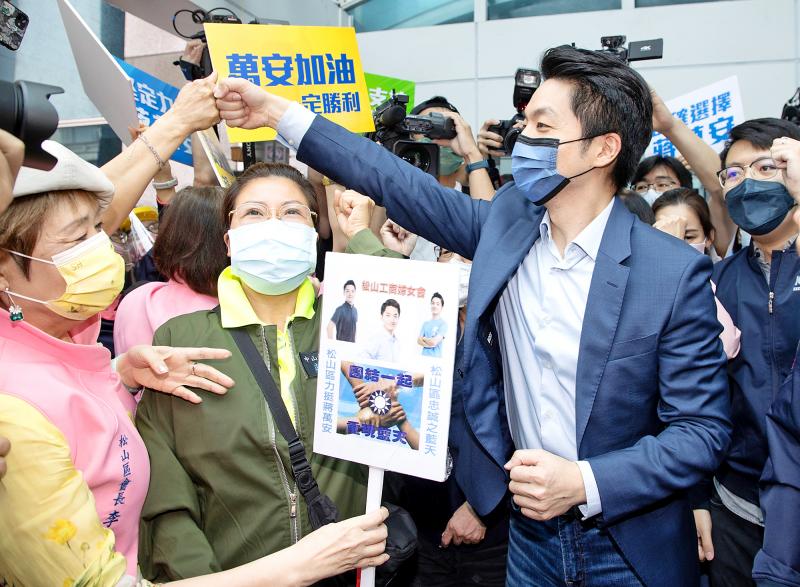The Chinese Nationalist Party (KMT) yesterday selected Legislator Chiang Wan-an (蔣萬安) as the party’s candidate for November’s mayoral election in Taipei.
At the party’s Central Standing Committee meeting in Taipei, KMT Chairman Eric Chu (朱立倫) announced the selection of the 43-year-old lawmaker, who Chu described as a rising star.
Chiang’s legislative experience and solid academic background would bring about “a new chapter” for the capital’s 2.51 million residents, Chu said.

Photo: CNA
Chiang later told reporters that he would do his best to garner the support of Taipei’s voters and that he was “confident” about winning.
The candidate highlighted issues that Taipei has grappled with, including a declining population and stalled development.
Chiang criticized the government for what he described as an inadequate response to COVID-19, which he said had hit Taipei harder than other parts of the nation.
Without providing specifics, Chiang said he would use innovative, sustainable and technological means to make Taipei a progressive and global city.
Chiang, who previously worked as a corporate lawyer in the US, returned to Taiwan in 2013 and has been a legislator since 2016.
Chiang is the son of former KMT vice chairman John Chiang (蔣孝嚴), and purported great-grandson of former president Chiang Kai-shek (蔣介石).
John Chiang in 2005 changed his surname from Chang (章) to Chiang, and his family followed suit.
After graduating from National Chengchi University with a dual bachelor’s degree in diplomacy and law, Chiang Wan-an obtained a Juris Doctor in 2006 from the University of Pennsylvania.
Other parties have yet to announce their candidates for Taipei’s mayoral election, which is to take place on Nov. 26.
Media reports have over the past few months named Minister of Health and Welfare Chen Shih-chung (陳時中) of the DPP, and Deputy Taipei Mayor Huang Shan-shan (黃珊珊) of the People First Party as potential challengers to Chiang Wan-an.
The KMT also announced the selection of former legislator Hsieh Kuo-liang (謝國樑) and Legislator Hsu Shu-hua (許淑華) as the party’s candidates for Keelung mayor and Nantou County commissioner respectively.

Alain Robert, known as the "French Spider-Man," praised Alex Honnold as exceptionally well-prepared after the US climber completed a free solo ascent of Taipei 101 yesterday. Robert said Honnold's ascent of the 508m-tall skyscraper in just more than one-and-a-half hours without using safety ropes or equipment was a remarkable achievement. "This is my life," he said in an interview conducted in French, adding that he liked the feeling of being "on the edge of danger." The 63-year-old Frenchman climbed Taipei 101 using ropes in December 2004, taking about four hours to reach the top. On a one-to-10 scale of difficulty, Robert said Taipei 101

A preclearance service to facilitate entry for people traveling to select airports in Japan would be available from Thursday next week to Feb. 25 at Taiwan Taoyuan International Airport, Taoyuan International Airport Corp (TIAC) said on Tuesday. The service was first made available to Taiwanese travelers throughout the winter vacation of 2024 and during the Lunar New Year holiday. In addition to flights to the Japanese cities of Hakodate, Asahikawa, Akita, Sendai, Niigata, Okayama, Takamatsu, Kumamoto and Kagoshima, the service would be available to travelers to Kobe and Oita. The service can be accessed by passengers of 15 flight routes operated by

Taiwanese and US defense groups are collaborating to introduce deployable, semi-autonomous manufacturing systems for drones and components in a boost to the nation’s supply chain resilience. Taiwan’s G-Tech Optroelectronics Corp subsidiary GTOC and the US’ Aerkomm Inc on Friday announced an agreement with fellow US-based Firestorm Lab to adopt the latter’s xCell, a technology featuring 3D printers fitted in 6.1m container units. The systems enable aerial platforms and parts to be produced in high volumes from dispersed nodes capable of rapid redeployment, to minimize the risk of enemy strikes and to meet field requirements, they said. Firestorm chief technology officer Ian Muceus said

MORE FALL: An investigation into one of Xi’s key cronies, part of a broader ‘anti-corruption’ drive, indicates that he might have a deep distrust in the military, an expert said China’s latest military purge underscores systemic risks in its shift from collective leadership to sole rule under Chinese President Xi Jinping (習近平), and could disrupt its chain of command and military capabilities, a national security official said yesterday. If decisionmaking within the Chinese Communist Party has become “irrational” under one-man rule, the Taiwan Strait and the regional situation must be approached with extreme caution, given unforeseen risks, they added. The anonymous official made the remarks as China’s Central Military Commission Vice Chairman Zhang Youxia (張又俠) and Joint Staff Department Chief of Staff Liu Zhenli (劉振立) were reportedly being investigated for suspected “serious